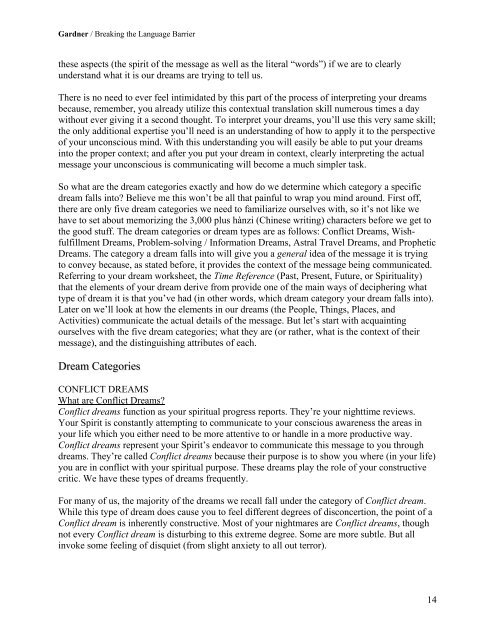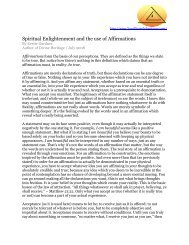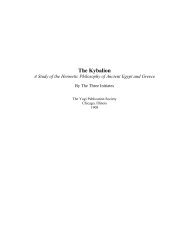Breaking the Language Barrier: Learning to Interpret Your Dreams
Breaking the Language Barrier: Learning to Interpret Your Dreams
Breaking the Language Barrier: Learning to Interpret Your Dreams
You also want an ePaper? Increase the reach of your titles
YUMPU automatically turns print PDFs into web optimized ePapers that Google loves.
Gardner / <strong>Breaking</strong> <strong>the</strong> <strong>Language</strong> <strong>Barrier</strong><br />
<strong>the</strong>se aspects (<strong>the</strong> spirit of <strong>the</strong> message as well as <strong>the</strong> literal “words”) if we are <strong>to</strong> clearly<br />
understand what it is our dreams are trying <strong>to</strong> tell us.<br />
There is no need <strong>to</strong> ever feel intimidated by this part of <strong>the</strong> process of interpreting your dreams<br />
because, remember, you already utilize this contextual translation skill numerous times a day<br />
without ever giving it a second thought. To interpret your dreams, you’ll use this very same skill;<br />
<strong>the</strong> only additional expertise you’ll need is an understanding of how <strong>to</strong> apply it <strong>to</strong> <strong>the</strong> perspective<br />
of your unconscious mind. With this understanding you will easily be able <strong>to</strong> put your dreams<br />
in<strong>to</strong> <strong>the</strong> proper context; and after you put your dream in context, clearly interpreting <strong>the</strong> actual<br />
message your unconscious is communicating will become a much simpler task.<br />
So what are <strong>the</strong> dream categories exactly and how do we determine which category a specific<br />
dream falls in<strong>to</strong> Believe me this won’t be all that painful <strong>to</strong> wrap you mind around. First off,<br />
<strong>the</strong>re are only five dream categories we need <strong>to</strong> familiarize ourselves with, so it’s not like we<br />
have <strong>to</strong> set about memorizing <strong>the</strong> 3,000 plus hànzi (Chinese writing) characters before we get <strong>to</strong><br />
<strong>the</strong> good stuff. The dream categories or dream types are as follows: Conflict <strong>Dreams</strong>, Wishfulfillment<br />
<strong>Dreams</strong>, Problem-solving / Information <strong>Dreams</strong>, Astral Travel <strong>Dreams</strong>, and Prophetic<br />
<strong>Dreams</strong>. The category a dream falls in<strong>to</strong> will give you a general idea of <strong>the</strong> message it is trying<br />
<strong>to</strong> convey because, as stated before, it provides <strong>the</strong> context of <strong>the</strong> message being communicated.<br />
Referring <strong>to</strong> your dream worksheet, <strong>the</strong> Time Reference (Past, Present, Future, or Spirituality)<br />
that <strong>the</strong> elements of your dream derive from provide one of <strong>the</strong> main ways of deciphering what<br />
type of dream it is that you’ve had (in o<strong>the</strong>r words, which dream category your dream falls in<strong>to</strong>).<br />
Later on we’ll look at how <strong>the</strong> elements in our dreams (<strong>the</strong> People, Things, Places, and<br />
Activities) communicate <strong>the</strong> actual details of <strong>the</strong> message. But let’s start with acquainting<br />
ourselves with <strong>the</strong> five dream categories; what <strong>the</strong>y are (or ra<strong>the</strong>r, what is <strong>the</strong> context of <strong>the</strong>ir<br />
message), and <strong>the</strong> distinguishing attributes of each.<br />
Dream Categories<br />
CONFLICT DREAMS<br />
What are Conflict <strong>Dreams</strong><br />
Conflict dreams function as your spiritual progress reports. They’re your nighttime reviews.<br />
<strong>Your</strong> Spirit is constantly attempting <strong>to</strong> communicate <strong>to</strong> your conscious awareness <strong>the</strong> areas in<br />
your life which you ei<strong>the</strong>r need <strong>to</strong> be more attentive <strong>to</strong> or handle in a more productive way.<br />
Conflict dreams represent your Spirit’s endeavor <strong>to</strong> communicate this message <strong>to</strong> you through<br />
dreams. They’re called Conflict dreams because <strong>the</strong>ir purpose is <strong>to</strong> show you where (in your life)<br />
you are in conflict with your spiritual purpose. These dreams play <strong>the</strong> role of your constructive<br />
critic. We have <strong>the</strong>se types of dreams frequently.<br />
For many of us, <strong>the</strong> majority of <strong>the</strong> dreams we recall fall under <strong>the</strong> category of Conflict dream.<br />
While this type of dream does cause you <strong>to</strong> feel different degrees of disconcertion, <strong>the</strong> point of a<br />
Conflict dream is inherently constructive. Most of your nightmares are Conflict dreams, though<br />
not every Conflict dream is disturbing <strong>to</strong> this extreme degree. Some are more subtle. But all<br />
invoke some feeling of disquiet (from slight anxiety <strong>to</strong> all out terror).<br />
14






